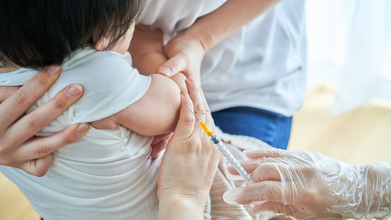- Health Conditions A-Z
- Health & Wellness
- Nutrition
- Fitness
- Health News
- Ayurveda
- Videos
- Medicine A-Z
- Parenting
How Antimicrobial Resistance Threatens Neonatal Mortality Rates Globally

How Antimicrobial Resistance Threatens Neonatal Mortality Rates Globally
Neonatal mortality remains a major health challenge across the world, which involves neonatal sepsis and other related factors of prematurity. Though many strides have been done in reducing NMR, there is a need for more appropriate interventions and strategies directed towards addressing the rise in the escalation of AMR. Combating AMR will be critical in improving neonatal survival rates while giving each newborn a healthier start into life globally.
The newborn period is the key period for infant health, and the first 28 days of life are critically important-both for survival and as a base to set lifetime health and development. Neonatal deaths globally have witnessed a significant decline over the past couple of decades. The neonatal mortality count has significantly reduced dropping from a high of 5 million in 1990 to as low as 2.3 million as of 2022. However, this decline notwithstanding, neonatal mortality is still staggeringly high across low-and middle-income nations.
Neonatal mortality rates are 22 per 1000 live births in India. Neonatal sepsis and prematurity are the main causes of neonatal deaths in these tragic events. Recognizing the gravity of the issue the Indian government started the Indian Newborn Action Plan (INAP) in 2014. The goal is to take NMR down to the single digits by 2030. This initiative has brought in several key interventions, including antenatal care (vaccines, micronutrient supplementation), skilled birth attendance, clean birth practices, and neonatal resuscitation techniques. More promisingly, postnatal interventions, including early initiation of breastfeeding and skin-to-skin contact, have been proven to work well in improving newborn survival rates.
Despite these improvements, one of the biggest concerns in neonatal care today is the growing problem of antimicrobial resistance (AMR) which seriously threatens efforts to reduce neonatal mortality.
What is Antimicrobial Resistance?
Antimicrobial resistance occurs when microorganisms such as bacteria, viruses and fungi evolve over time and become resistant to commonly used antibiotics and other medications. This resistance makes infections more difficult to treat, increasing the risk of mortality and complicating treatment options. The World Health Organization has classified AMR as one of the most urgent global health threats since it not only causes death and disability but also places immense pressure on healthcare systems, significantly raising the economic burden.
The sources of AMR are many, including poor hygiene and infection control in healthcare settings, overuse and misuse of antibiotics. Contributing factors to this rapidly growing problem are antibiotic prescriptions for patient needs that do not require them and failure to complete antibiotic courses, as prescribed.
AMR and Newborn Health
For neonates, the risk is much more vital for AMR. Neonates are particularly prone to developing infections due to their rather weak immune systems. Neonatal sepsis, severe bacterial infection, is one of the leading causes of neonate deaths and it often manifests complications when it is because of drug-resistant pathogens.
According to Dr. Apoorva Taduri, Consultant Neonatologist, "Neonatal sepsis accounts for a significant proportion of neonatal deaths, and AMR is making it worse. MDR pathogens cause around 30% of neonatal sepsis mortality globally.
Maternal health and care are also factors influencing AMR in neonates. Over-prescription of antibiotics during pregnancy increases the risk of neonatal sepsis and the development of multi-drug-resistant pathogens in newborns. This calls for prudent use of antibiotics during pregnancy and at the time of delivery. In fact, studies indicate that indiscriminate use of antibiotics in mothers has a direct impact on neonatal health, which may eventually lead to resistant infections in newborns.
One of the major issues is that the drug-resistant bacteria are causing an increasing number of healthcare-associated infections in the neonatal care settings, which include NICUs. Infections by such bacteria prove to be challenging to treat; they require more advanced, expensive interventions, and the period of risk of mortality and morbidity is extended.
Counteracting AMR in Neonatal Care
To combat AMR and reduce neonatal mortality a multifaceted approach is necessary. Dr. Taduri emphasizes the continuation of the strategies outlined by the Indian Newborn Action Plan (INAP), specifically in reducing neonatal sepsis and improving infection control. However, to combat AMR more must be done to ensure proper use of antibiotics in both maternal and neonatal care settings.
Key strategies for reducing AMR in neonatal care are:
1. Improving Infection Prevention Practice: This implies, therefore, that more efforts would be made regarding stricter hospital hygiene standards, strict equipment sterilization after its usage and even maintaining adequate hand hygiene. Enhanced infection control practices greatly impact minimizing AMR pathogens distribution.
2. Antibiotic Stewardship- Teaching the healthcare providers how not to use antibiotics is a crucial thing in preventing overuse prescription. Antibiotic stewardship programs are designed to promote use of antibiotics only when truly required; appropriate drug, dose and length of treatment should be taken.
3. Improved access to WASH: Access to clean water and sanitation is a fundamental aspect of preventing infections in mothers and newborns. WASH interventions such as clean birthing practices, can reduce the risk of neonatal sepsis due to unsanitary conditions.
4. Maternal Health Strengthening: Proper maternal care, such as proper vaccination, antenatal steroids, and supplementation of micronutrients, can reduce the risk of prematurity and neonatal infection. Prevention of infection in mothers is the first step towards prevention of infection in newborns.
5. Early Diagnosis and Treatment: Early identification and treatment of neonatal infections are very important. This includes proper screening for sepsis and the use of appropriate antibiotics based on the local resistance patterns. It also involves ensuring that infants receive adequate neonatal care, such as those provided in Special Newborn Care Units (SNCUs).
The rise of antimicrobial resistance is a global health challenge that requires urgent action. Combating AMR requires a coordinated effort from governments, healthcare systems and communities worldwide. In neonatal care, addressing AMR is essential to further reducing neonatal mortality rates and ensuring that every newborn has the opportunity to thrive.
As Dr. Taduri concludes, "While we have made substantial progress in reducing neonatal mortality, the emerging risk of antimicrobial resistance creates a major challenge for our efforts. Combating AMR requires a global collective effort, with priorities on infection prevention, responsible use of antibiotics, and enhancement of healthcare practices to ensure a healthier future for all newborns."
Dr Apoorva Taduri is a Consultant Neonatologist at Fernandez Hospital
Fact Check: Is Weight Lifting Safe for Teens? An Expert Explains the Risks and Safer Alternatives

Credits: iStock
Should teens be lifting weights? This is a question many people wonder, and Cara Natterson, a pediatrician, finally has answers! "Tweens and teens should not be lifting heavy weights, but they absolutely can do resistance training. There is an important difference between the two," she says.
In an Instagram video, shared by the account @less.awkward, which is ran by Natterson, and Vanessa Kroll Bennett, Natterson explains that during puberty, "the body is flooded with hormones like testosterone, estrogen, progesterone, and growth hormone, which together trigger the release of IGF-1, a key driver of growth spurts and cartilage development".
Also Read: Measles Outbreak Confirmed In Two South Carolina College
So, What Happens When A Teen Trains?
“When kids are growing rapidly, the cartilage around their bones is actually weaker than the bone itself, which makes them more vulnerable to injury during weight lifting," she points out. She further explains that in peak growth phases, bones are still mineralizing. They form a scaffold first and fill in later, which means the bones are porous and easier to injure at this stage.
“The most vulnerable part of a growing bone is the growth plate, which sits at the ends of long bones and is the weakest point when it comes to fractures.” Natterson says that if a child gets injured during weight lifting or even sports, the growth plate is often where that injury occurs. This is why kids should not be bearing heavy weights until they are done with their growth spurts, she says. However, she points out that this "does not mean they should avoid strength-building altogether".
“Resistance training, where children use their own body weight, is not only safe but encouraged. Even five, six, and seven-year-olds can do it," she says.
Also Read: Have You Also Noticed Suddenly Becoming Lactose Intolerant? Nutritionist Explains Why
What Is Resistance Training?
Exercises like push-ups, pull-ups, sit-ups, squats, and anything that makes one use their own body weight is safe. Natterson says, “Exercises like push-ups and pull-ups strengthen muscles and improve bone density without putting excessive pressure on weak cartilage, thin bones, or growth plates.”
For more impact, one can use resistance bands. While people also use dumbbells, barbells, and kettlebells, Natterson recommends to avoid any weights during the growth spurt.
Here Are Some Examples Of Resistance Training That One Can Do Without Lifting Weights
Chest Press
- Wrap your resistance band behind your back.
- Hold both ends with your hands and start with your arms at your side.
- Bend your elbows and push the band in front of you.
Bicep Curls
- Stand on the resistance band and hold both ends in hands.
- With your arms extended by side, pull your hand up, keep elbow bent at side.
- Do it with one or both arms.

Squats
- Stand on your resistance band and grab both ends with your hands.
- In a squat position, hold the bands but do not lock your arms.
- Extend your knees until you are in a standing position.
Pull Ups

- Grip a bar with hands shoulder width apart.
- Start with a full hang, then pull your body up by squeezing your shoulder blades down and back until your chin clears the bar
- Then lower down the control and keep your core engaged.
Push Ups

- Start is high plank with hands wider then shoulders.
- Keep your core tight and body in a straight line from head to heels.
- Lower your chest towards the floor by bending elbows to 90 degrees.
- Push back up powerfully to the starting position, maintain a rigid core and straight back throughout.
Your Child’s 2026 Vaccine Checklist: What to Take, When, And Why It Matters, According To Doctor

Credits: Canva
A healthy childhood begins with timely protection, and vaccination remains one of the most effective ways to keep children safe from serious, sometimes life-threatening diseases. With updated recommendations for 2026, parents are being urged to take a fresh look at their child’s immunization schedule and ensure that no essential dose is missed.
“Parents often think of vaccines as optional or something that can be delayed, but infections do not wait,” says Dr Nishant Bansal, Consultant Pediatrician and Neonatologist at Motherhood Hospitals, Noida. “Vaccination at the right age gives a child the best possible start and prevents complications that we still see far too often in hospitals.”
Children’s immune systems are still developing, which makes them more vulnerable to infections. Vaccines work by training the immune system to recognize and fight germs without causing the disease itself. This reduces the risk of severe illness, hospitalization, long-term complications, and even school absenteeism. On a larger level, widespread vaccination protects newborns, elderly family members, and children with weaker immunity by limiting the spread of infections.
Vaccines Recommended for All Children in 2026
According to Dr Bansal, the 2026 vaccine list continues to focus on preventing both long-standing and emerging health threats. He explains that these vaccines are backed by years of research and real-world evidence showing their effectiveness and safety.
Some of the key vaccines recommended for children include:
Diphtheria, Tetanus, and Pertussis (DTaP or Tdap): These protect against serious bacterial infections, including whooping cough, which can be life-threatening for infants.
Polio (IPV): Prevents paralysis caused by poliovirus and remains crucial despite India being polio-free.
Measles, Mumps, and Rubella (MMR): Protects against highly contagious viral illnesses that can lead to complications like hearing loss, brain inflammation, and pregnancy-related risks later in life.
Chickenpox (Varicella): Prevents painful blisters and reduces the risk of severe skin infections and pneumonia.
Hemophilus influenzae type b (Hib): Offers protection against meningitis and pneumonia, especially in young children.
Pneumococcal Conjugate Vaccine (PCV): Helps prevent pneumonia, meningitis, and serious bloodstream infections.
Hepatitis A and B: Protect the liver from viral infections that can lead to chronic disease.
Human Papillomavirus (HPV): Recommended for older children and adolescents to protect against cancers linked to HPV later in life.
Meningococcal vaccines (MenACWY and MenB): Recommended starting at 9 months and 1 year, though they can be given later as well, to prevent serious brain and blood infections.
Rotavirus, Influenza (Flu), and COVID-19 vaccines: These continue to be important in reducing severe disease, hospitalization, and complications.
Respiratory Syncytial Virus (RSV): Especially recommended for infants at higher risk of severe infection.
“Each of these vaccines has a role,” Dr Bansal explains. “Some prevent infections that spread very fast, while others protect against diseases that cause long-term damage. Together, they form a safety net for the child.”
The Importance of Follow-Ups and Booster Doses
One common misconception among parents is that skipping or delaying vaccines is harmless. Dr Bansal strongly disagrees. “Missing follow-up doses can weaken the protection a vaccine offers,” he says. “Some vaccines need multiple doses to build strong and lasting immunity, while booster shots help maintain that protection as the child grows.”
He adds that parents should not panic if a dose is missed. “In most cases, the schedule does not need to be restarted. A pediatrician can guide you on when to safely take the next dose.”
How Parents Can Stay on Track
Keeping a vaccination record, setting reminders for upcoming doses, and attending scheduled follow-up visits are simple but effective steps. Dr Bansal advises parents to have an open discussion with their child’s doctor and get a vaccination schedule tailored to the child’s age, health, and risk factors.
“Vaccination is not just about preventing illness,” he says. “It is about giving children the freedom to grow, learn, and thrive without avoidable health setbacks.”
As 2026 approaches, experts urge parents to prioritize immunization and make informed decisions. A timely visit to your pediatrician and adherence to the recommended schedule can go a long way in keeping your child, and the community, healthy and protected.
End Of 'Gentle Parenting'? Why Gen Z Parents Are Turning To 'FAFO'

Credits: iStock
Parenting expert Bethany Braun-Silva in a conversation with ABC News says that 2025 was the banner year for gentle parenting, but the tide is shifting now. However, she notes, "parents are understanding now that emotional awareness and empathy is as important as setting firm boundaries and parental expectations." This is why 2026 is now becoming a year when there is a shift away from gentle parenting. She notes that gentle parenting actually stands for firm boundaries, however, "some people rode that 'gentle' train too seriously".
An article by Mother.ly notes that critics often argue that gentle parenting often blurs the line between kindness and permissiveness. It argues that this leaves parents at the risk of being seen as pushovers. In fact, new research shows that it is the Gen Z parents who are moving away form "gentle parenting".
What Is The New FAFO Parenting Style Gen Z Moms And Dad Are Switching Too?
Another Wall Street Journal piece notes that more and more parents are now embracing FAFO, which is short for F-Around and Find Out. What does it mean? The idea is that parents can ask and warn their children, but if the child breaks the rules, parents cannot stand in the line of repercussions. "Won’t bring your raincoat? Walk home in the downpour. Didn’t feel like having lasagna for dinner? Survive until breakfast. Left your toy on the floor again? Go find it in the trash under the lasagna you didn’t eat," notes the WSJ.
Parenting styles that emphasized minimal discipline have shaped child-rearing over the past few decades. Critics now argue that this approach has contributed to some of Gen Z’s struggles in adulthood. They point to surveys showing young adults grappling with workplace relationships and rising anxiety and depression, questioning whether constant parental intervention and a reluctance to say “no” played a role.
For parents who have spent years trying to balance emotional support without tipping into permissiveness, FAFO can feel refreshingly straightforward.
What Is Wrong With Gentle Parenting?
The argument is that gentle parenting puts a lot of pressure on parents, and promote unrealistic expectations. Emily Edlynn, a licensed clinical psychologist who specializes in pediatric health psychologist writes for Psychology Today, that gentle parenting "adds stress to parenting that we don’t need. Higher stress undoubtedly impacts our relationship with our child in a negative way, more so than having our authentic moments of being human".
She argues that it is okay for parents to show frustration with a child who has asked the same question for the seventeenth time because the child did not like the answer. She says that expressing is better than holding all the frustration in. In fact this shows a natural demonstration of feelings and teaches the child to be expressive too.
Gentle parenting discussions often blur the line between punishment and discipline. Decades of research show that behavioral tools are not inherently punitive and can be an effective part of discipline. Discipline is meant to teach, while punishment is not. It is possible to combine emotional connection with clear consequences.
© 2024 Bennett, Coleman & Company Limited

